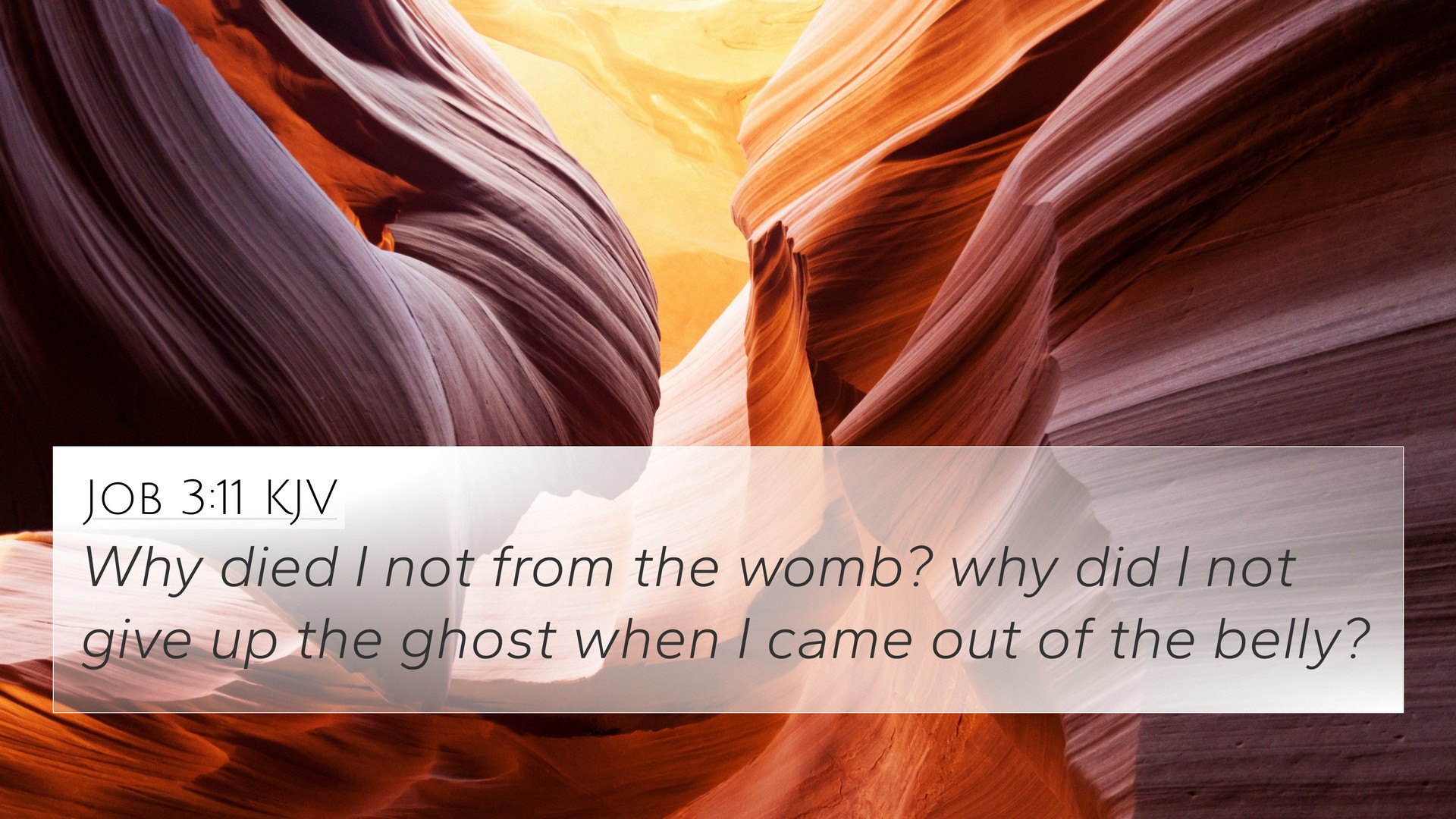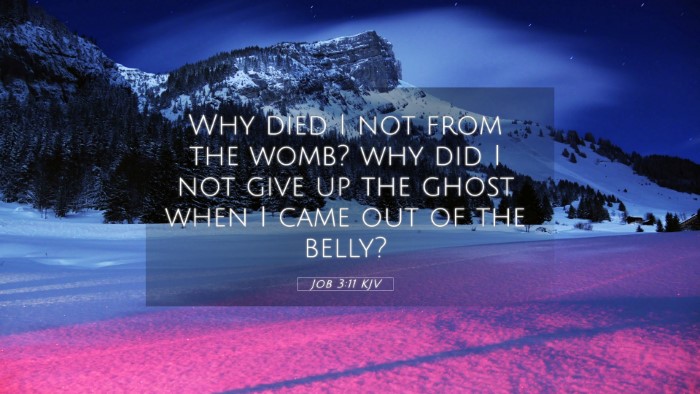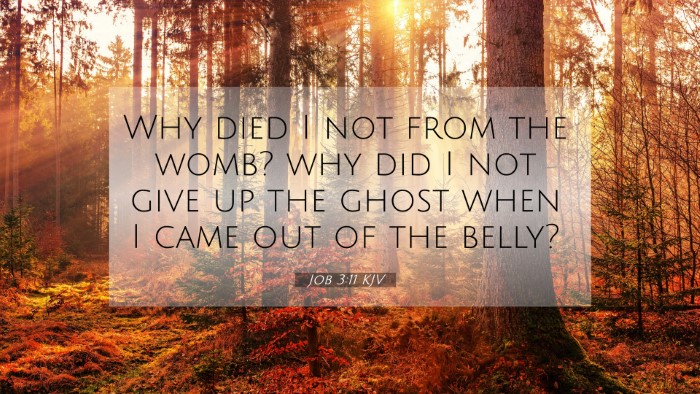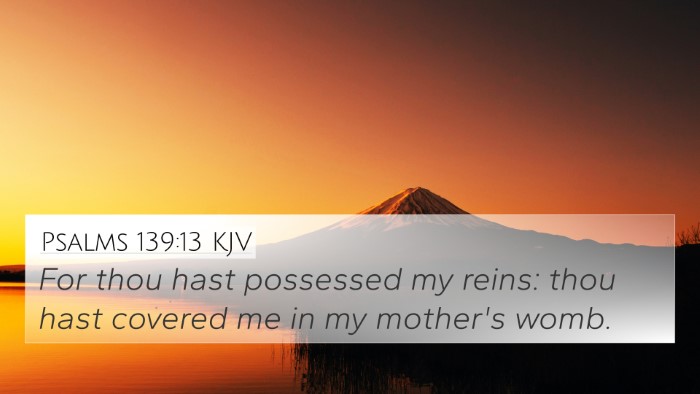Old Testament
Genesis Exodus Leviticus Numbers Deuteronomy Joshua Judges Ruth 1 Samuel 2 Samuel 1 Kings 2 Kings 1 Chronicles 2 Chronicles Ezra Nehemiah Esther Job Psalms Proverbs Ecclesiastes Song of Solomon Isaiah Jeremiah Lamentations Ezekiel Daniel Hosea Joel Amos Obadiah Jonah Micah Nahum Habakkuk Zephaniah Haggai Zechariah MalachiJob 3:11 Similar Verses
Job 3:11 Cross References
Why died I not from the womb? why did I not give up the ghost when I came out of the belly?
Uncover the Rich Themes and Topics of This Bible Verse
Listed below are the Bible themes associated with Job 3:11. We invite you to explore each theme to gain deeper insights into the Scriptures.
Job 3:11 Cross Reference Verses
This section features a detailed cross-reference designed to enrich your understanding of the Scriptures. Below, you will find carefully selected verses that echo the themes and teachings related to Job 3:11 KJV. Click on any image to explore detailed analyses of related Bible verses and uncover deeper theological insights.
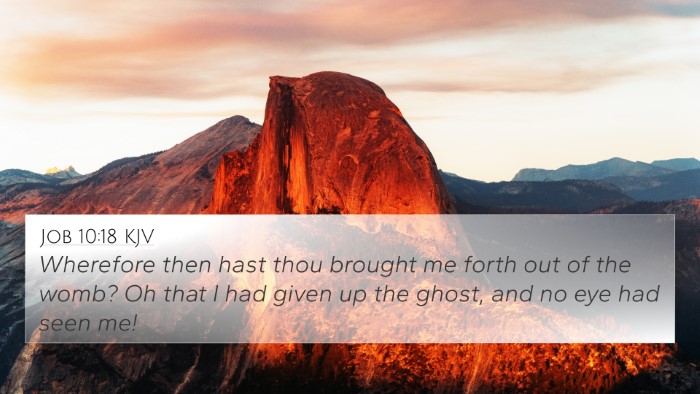
Job 10:18 (KJV) »
Wherefore then hast thou brought me forth out of the womb? Oh that I had given up the ghost, and no eye had seen me!

Psalms 22:9 (KJV) »
But thou art he that took me out of the womb: thou didst make me hope when I was upon my mother's breasts.
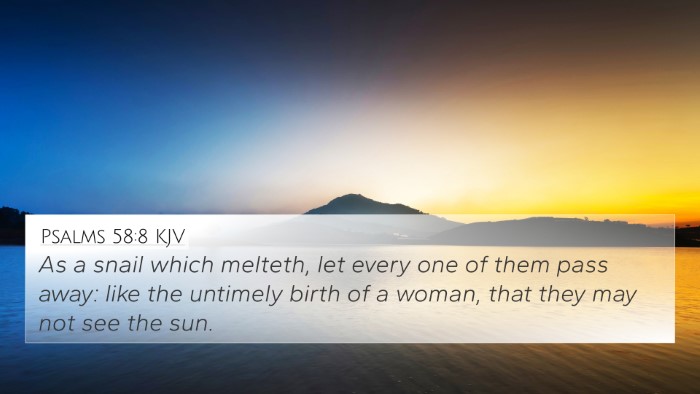
Psalms 58:8 (KJV) »
As a snail which melteth, let every one of them pass away: like the untimely birth of a woman, that they may not see the sun.
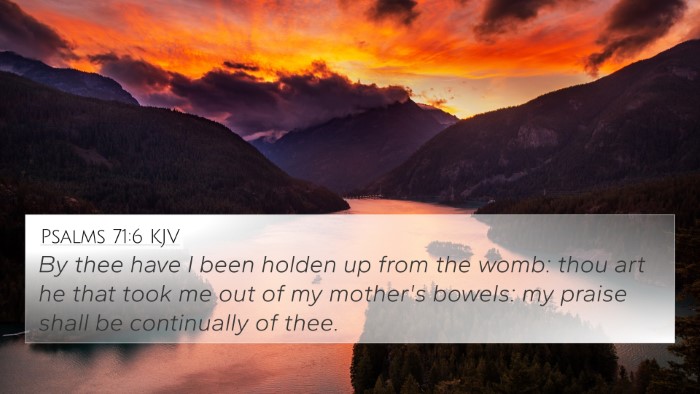
Psalms 71:6 (KJV) »
By thee have I been holden up from the womb: thou art he that took me out of my mother's bowels: my praise shall be continually of thee.

Isaiah 46:3 (KJV) »
Hearken unto me, O house of Jacob, and all the remnant of the house of Israel, which are borne by me from the belly, which are carried from the womb:
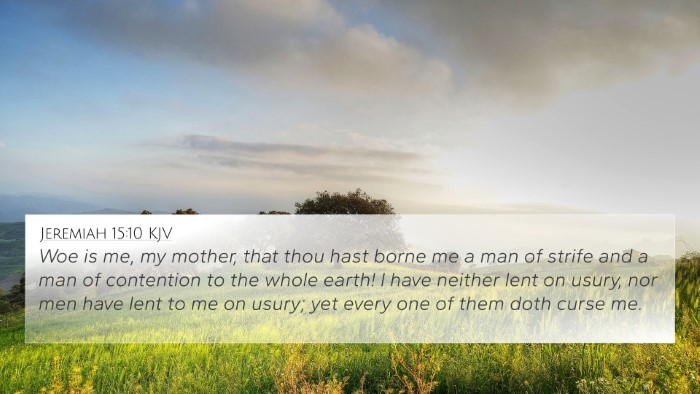
Jeremiah 15:10 (KJV) »
Woe is me, my mother, that thou hast borne me a man of strife and a man of contention to the whole earth! I have neither lent on usury, nor men have lent to me on usury; yet every one of them doth curse me.
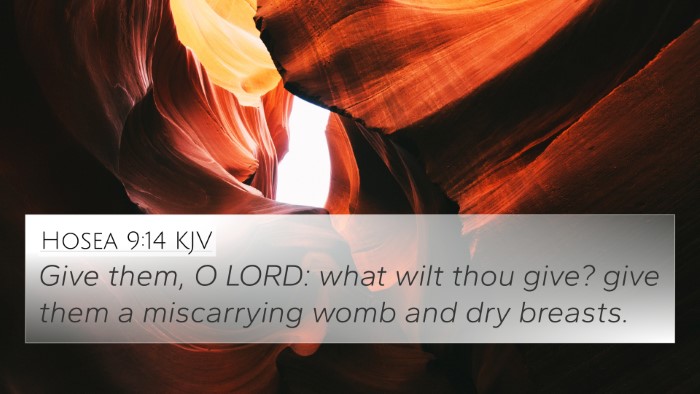
Hosea 9:14 (KJV) »
Give them, O LORD: what wilt thou give? give them a miscarrying womb and dry breasts.
Job 3:11 Verse Analysis and Similar Verses
Understanding Job 3:11
Job 3:11 reads: "Why died I not from the womb? why did I not give up the ghost when I came out of the belly?" This verse encapsulates Job's profound despair, questioning the purpose of his life amidst his intense suffering. Below is a detailed exploration of Job 3:11, drawing from the insights of public domain commentaries.
Verse Context
The context of Job 3:11 is critical for understanding its depth. After having lost his wealth, health, and family, Job laments his existence. This chapter marks the beginning of Job's cursing of the day of his birth, a theme that runs through this portion of the book.
Commentary Insights
Matthew Henry's Commentary
Matthew Henry notes that Job’s deep anguish leads him to wish that he had never been born. His eloquent sorrow reflects the emotional turmoil of a man who has experienced profound loss. Henry highlights that such despair can lead individuals to question their very existence and purpose. Job’s lamentation serves as a testament to human suffering and the struggle to find meaning amidst pain.
Albert Barnes' Commentary
Albert Barnes emphasizes the rhetorical nature of Job’s question. He suggests that Job's expression demonstrates the height of his misery. Barnes interprets this moment as Job’s isolation; he feels abandoned by God and man. Here, Job articulates a strong desire to escape the torment of life instead of confronting it. Job’s plea reveals man’s intrinsic struggle with mortality and suffering.
Adam Clarke's Commentary
Adam Clarke provides a more psychological angle, suggesting that Job is in the depths of despair, unable to see any hope for his future. Clarke makes a note of the existential questions that Job raises, which resonate through the ages. He comments on the human tendency to wish for nonexistence in the face of overwhelming grief and challenges that seem insurmountable.
Cross-References
To deepen the understanding of Job 3:11, several cross-references and related Bible verses can be explored:
- Psalm 73:21-22 - Expresses the confusion and pain that can lead to questioning one's existence.
- Jeremiah 20:14-18 - A deep lament similar to Job's, wherein the prophet wishes he had never been born.
- Ecclesiastes 4:2-3 - Reflects on the futility of life and the desire to not exist due to suffering.
- Revelation 9:6 - Provides insight into the desire to escape suffering, as it discusses a time when people wish for death due to their anguish.
- Romans 8:18 - Contrasts present sufferings with the hope of future glory, giving a perspective on Job's despair.
- 2 Corinthians 1:8-9 - Shares Paul’s experiences of despair and highlights the hope that can be found in God.
- Job 10:18-19 - Job directly questions his purpose of being born, a continuation of his lament in Chapter 3.
- Matthew 26:38 - Jesus expresses deep sorrow, reflecting the human experience of anguish.
- Philippians 1:21-23 - Discusses life and death in Christ, juxtaposing the desire to live with the hope of eternal life.
- Psalm 139:13-16 - Highlights the value of life and God's purpose in creation, contrasting Job's despair.
Thematic Connections
The connection of Job's lament to other biblical texts reveals a common theme: the struggle with suffering and the search for meaning. The following themes emerge when linking these verses:
- Suffering and Lament: Job parallels prophets like Jeremiah, who also experiences desolation.
- Existential Questions: Various Scriptures reflect the human search for purpose amidst pain.
- Hope in Suffering: New Testament writings offer a counterpoint to despair, emphasizing the hope available in Christ.
- Value of Life: Many verses affirm life's purpose, creating a dialogue with Job's deep questions.
Conclusion
Job 3:11 serves as a poignant reminder of the struggle against despair and the human condition's fragility. By exploring this verse through the lens of public domain commentaries and related Scripture, we can gain insight into the complexities of suffering and the search for meaning.
Further Study and Tools for Cross-Referencing
For those interested in delving deeper into Biblical connections, consider exploring:
- Bible concordance: A key tool for finding cross-references.
- Bible cross-reference guide: Helps identify related themes throughout Scripture.
- Cross-reference Bible study: A method to enhance understanding of interconnected verses.
- Comprehensive Bible cross-reference materials: Resources that compile related texts based on themes.
Through these tools and reflections, one can cultivate a richer understanding of not only Job 3:11 but also the deeper dialogues present within the Bible.
